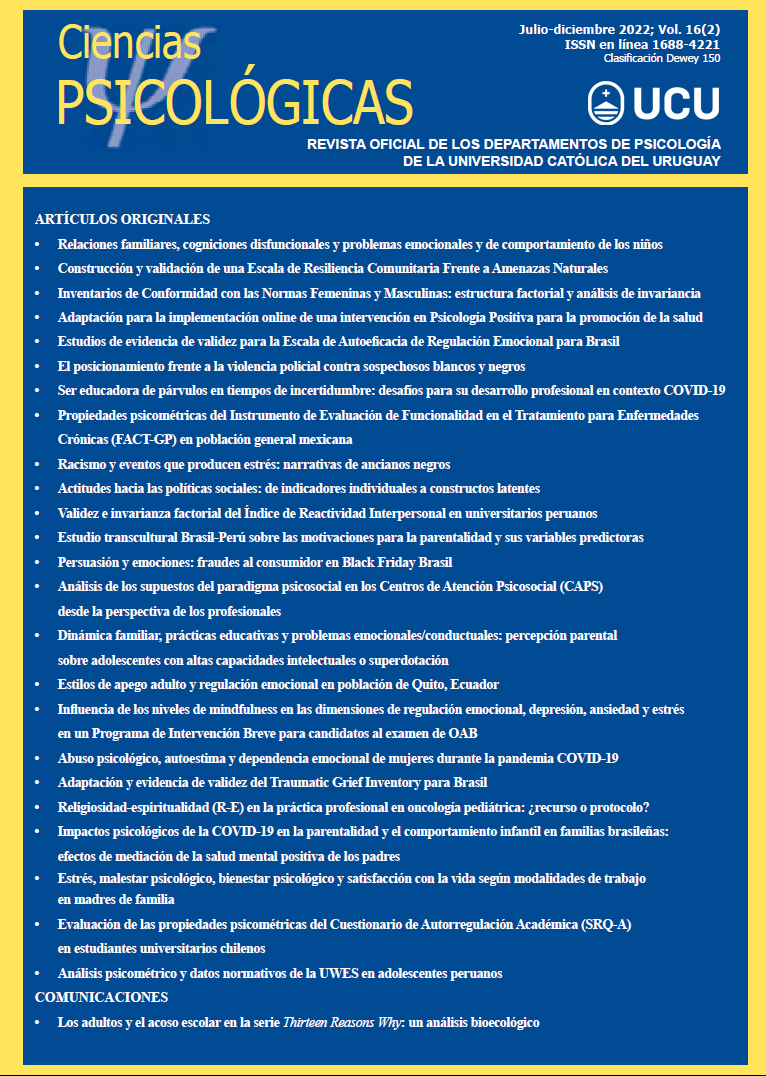Validity evidence studies of the Regulatory Emotional Self-Efficacy Scale in Brazil
DOI:
https://doi.org/10.22235/cp.v16i2.2395Keywords:
Social Cognitive Theory, emotional regulation, instrument validationAbstract
Self-efficacy for emotion regulation is understood as the perceived capability to regulate the negative affect and to express the positive ones. This study aimed at the validity evidence for the Regulatory Emotional Self-Efficacy Scale in the Brazilian context through two studies. In the first one, participants were 41 students from middle school (M = 13.49; SD = 1.52), being 58.5 % male. Results indicated a few adjustments in some items. The second study had 932 participants from two cities: one from Southeast Brazil and one from the North. The students were from middle and high schools being 50.3 % (n = 469) female. Their ages ranged from 13 to 23 years old (M = 16.50; SD = 1.52). After analysis through structural equation modeling, results indicated that the dimensions of the scale have a good fit according to the theoretical model with good accuracy indexes, thus confirming the validity evidence for this instrument, being reliable to be used in Brazil.
Downloads
References
Alessandri, G., Vecchione, M., & Caprara, G. V. (2015). Assessment of Regulatory Emotional Self-Efficacy Beliefs: A review of the status of the art and some suggestions to move forward the field. Journal of Psychoeducational Assessment, 33(1) 24-32. https://doi.org/10.1177/0734282914550382
Alessandri. G., Perinelli, E., De Longis, E., Schaufeli, W. B., Theodorou, A., Borgogni, L., Caprara, G. V., Cinque, L. (2018). Job burnout: The contribution of emotional stability and emotional self-efficacy beliefs. Journal of Occupational and Organizational Psychology, 91(4), 823-851. https://doi.org/10.1111/joop.12225
American Educational Research Association, American Psychological Association, & National Council Measurement in Education. (2014). Standards for educational and psychological testing. American Educational Research Association.
Bandura, A. (1986). Social foundations of thought and action (1st ed., Vol. 1). Prentice Hall.
Bandura, A. (1997). Self-efficacy: The exercise of control (1st ed., Vol. 1). Freeman.
Bandura, A., Caprara, G. V., Barbaranelli, C., Gerbino, M., & Pastorelli, C. (2003). Role of affective self-regulatory efficacy on diverse spheres of psychosocial functioning. Child Development, 74(3), 769-782. https://doi.org/10.1111/1467-8624.00567
Bassi, M., Fave, A. D., Steca, P., & Caprara, G. V. (2018). Adolescent’s regulatory emotional self-efficacy beliefs and daily affect intensity. Motivation and Emotion, 42, 287-298. https://doi.org/10.1007/s11031-018-9669-3
Borsa, J. C. (2022). Adaptação de instrumentos psicológicos. In J. C. Borsa, M. R. C. Lins & H. L. R. S. Rosa (Eds.), Dicionário de Avaliação Psicológica (1st ed., Vol. 1, pp. 3-7). Vetor Editora.
Caprara, G. V., Scabini, E., Barbaranelli, C., Pastorelli, C., Regalia, C., & Bandura, A. (1999). Autoefficacia percepita emotiva e interpersonale e buon funzionamento sociale. Giornale Italiano di Psicologia, 26, 769-789.
Caprara, G. V. & Gerbino, M. (2001). Affective perceived self-efficacy: The capacity to regulate negative affect and to express positive affect. In G. V. Caprara (Ed.), Self-efficacy assessment (1st ed., Vol. 1, pp. 35-50). Edizioni Erickson.
Caprara, G. V. & Steca, P. (2005). Affective and social self-regulatory efficacy beliefs as determinants of positive thinking and happiness. European Psychologist, 10(4), 275-286. https://doi.org/10.1027/1016-9040.10.4.275
Caprara, G. V., Di Giunta, L., Eisenberg, N., Gerbino, M., Pastorelli, C., & Tramontano, C. (2008). Assessing regulatory emotional self-efficacy in three countries. Psychological Assessment, 20(3), 227-237. https://doi.org/10.1037/1040-3590.20.3.227
Caprara, G, V., Di Giunta, L. D., Pastorelli, C., & Eisenberg, N. (2013). Mastery of negative affect: A hierarchical model of emotional self-efficacy beliefs. Psychological Assessment, 25(1), 105-116. https://doi.org/10.1037/a0029136
Di Giunta, L., Iselin, A. R, E. Lansford, J. E., Nancy Eisenberg, N. Lunetti, C., Thartori, E., Basili, E., Pastorelli, C., Bacchini, D., Tirado, L. M. U., & Gerbino, M. (2018). Parents' and early adolescents' self-efficacy about anger regulation and early adolescents' internalizing and externalizing problems: A longitudinal study in three countries. Journal of Adolescence, 64, 124-135. https://doi.org/10.1016/j.adolescence.2018.01.009
Gerbino, M., Milioni, M., Alessandri, G., Eisenberg, N., Caprara, M., Kupfer, A., Pastorelli, C., & Caprara, G. V. (2016). Self-efficacy in retrieving positive emotional experience and using humor. A validation study of a new instrument in three countries. European Journal of Psychological Assessment, 34(6), 409-420. https://doi.org/10.1027/1015-5759/a000356
Gunzenhauser, C., Heikamp, T., Gerbino, M., Alessandri, G., Suchodoletz, A., Di Giunta, L., Caprara, G. V., & Trommsdorff, G. (2013). Self-efficacy in regulating positive. and negative emotions: A validation study in Germany. European Journal of Psychological Assessment, 29(3), 197-204. https://doi.org/10.1027/1015-5759/a000151
Hair, J. F., Black, W. C., Babin, B. J., Anderson, R. E., & Tatham, R. L. (2009). Análise multivariada dos dados (1st ed., Vol. 1). Bookman.
Iaochite, R. T., Noronha, A. P. P., Casanova, D. C. G., Santos, A. A. A., & Azzi, R. G. (2022). Autoeficácia para Regulação Emocional e Autoeficácia Social: Busca de evidências de validade de construtos relacionados. Psico-USF, 27(1), 31-43. https://doi.org/10.1590/1413-82712022270103
Noronha, A. P. P., Baptista, M. N., & Batista, H. H. V. (2019). Initial psychometric studies of the Emotional Self-Regulation Scale: Adult and child-youth versions. Estudos de Psicologia, 36, e180109. https://doi.org/10.1590/1982-0275201936e180109
Noronha, A. P. P., Maciel, A. C. M., Santos, A. A. A., & Azzi, R. G. (2017). The Brazilian version of Escala de Autoeficácia da Regulação Emocional (AERE) [Unpublished yechnical report].
Rodrigues, S. Y. S., Carlotto, M. S., & Câmara, S. G. (2017). Impacto da regulação de emoções no trabalho sobre as dimensões de burnout em psicólogos: O papel moderador da autoeficácia. Análise Psicológica, 35(2), 191-201. https://doi.org/10.14417/ap.1147
Urbina, S. (2007). Fundamentos da Testagem Psicológica (1st ed., Vol. 1). Artmed.
Wang, X., Zhang, Y. Hui, Z., Bai, W. Terry, P. D., Ma, M., Li, Y. Cheng, L. Gu, W., & Wang, M. (2018). The mediating effect of regulatory emotional self-efficacy on the association between self-esteem and school bullying in middle school students: A cross-sectional study. International Journal of Environmental Research and Public Health, 15(5), 991-999. https://doi.org/10.3390/ijerph15050991
Zulli, K. J. & Valois, R. F. (2019). A preliminary study measuring social self-efficacy among early adolescents and its association with aggressive behavior. Journal of School Violence, 18(4), 498-509. https://doi.org/10.1080/15388220.2018.1553718
Downloads
Published
How to Cite
Issue
Section
License
Copyright (c) 2022 Universidad Católica del Uruguay

This work is licensed under a Creative Commons Attribution 4.0 International License.
















